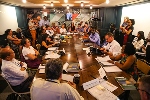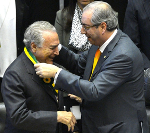Brazil
Brazil at the crossroads: the SDGs, the crises and the impact of COVID-19 Brazil: The local fills the national policy vacuum
By the end of June 2020, Brazil was the developing country most affected by COVID-19 in terms of number of cases and of diagnosticzed deaths, second only to the US on both indicators.
The Brazilian federal government, under president Jair Bolsonaro has abandoned many of its SDG commitments. There is no transparency in several policy areas and the government channels for dissemination are out of date or down. In addition, DecreeNo.9.759/2019 extinguished and limits the creation of collegiate bodies in the federal government, and thus the National SDGs Council, created in 2016 ceased to exist.
There is an increase in opacity in the executive's performance and also a lack of political will to respond to the health crisis. However, within states and municipalities, local political leaders are taking the response to the pandemic seriously. This movement of governors, mayors and subnational legislators has produced results in the control of COVID-19, stirring the country's political board in an election year with good experiences of dialogue and participation in the localization of the 2030 Agenda.
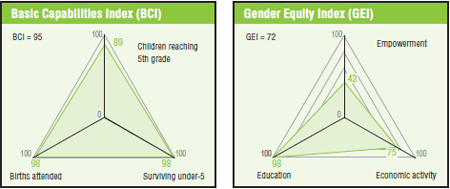
Published on Fri, 2020-10-16 11:55
Only a handful of political leaders decided to confront scientific advice, and one of these was President Jair Bolsonaro of Brazil, for whom COVID-19 was “just another little flu”. The result has been catastrophic, not just in terms of the pandemic (over 100,000 diagnosed deaths by mid-August 2020, second only to those in the USA) but also in terms of the economy that his denial policies tried to protect.
In June, the World Bank forecast an 8 percent decline in Brazil’s GDP in 2020 (from a previous forecast of 2% growth), while the global economy is estimated to decline by 4.9 percent and emerging market and developing economies, including Brazil, by 3 percent, in their first contraction in at least 60 years.
|
Published on Mon, 2019-11-18 14:00
 |
In Brazil the government of Captain Jair Bolsonaro does not make a secret of its disdain for policies and institutions aimed at supporting the people living in poverty. In its first day in office, on 1 January 2019, president Bolsonaro, dissolved the institutions responsible for the Zero Hunger policies (see Special Contribution 0.2 on the temporary extinction of CONSEA), an initiative that inspired anti-poverty policies around the world. The report by INESC documents the reduction, in the following weeks of policy spaces with civil society participation from 500 to 70. The affected monitoring bodies include the Council for Drug Policies, Council on the Rights of Persons with Disabilities, Council for the Eradication of Forced Labour, Commission for Biodiversity, and many more. Land-right defenders, trade unionist and NGO activists are being threatened and the Pastoral Commission on Land, a body of the Catholic Church, reported a dramatic increase in the first months of 2019 of murders related to land conflicts.
|
Published on Fri, 2018-09-14 11:32
Austerity is a major concern in the report of Brazil. After over a decade of meaningful progress in tackling poverty through public investments in health, education and social protection, constitutional amendment 95/2016 (CA 95), known as the “Expenditure Rule”, came into force in 2017, freezing real public spending for 20 years. “By constitutionalizing austerity in this way”, comments the report by INESC, “any future elected governments will be prevented from democratically determining the size of human rights and basic needs investments.”
Rule CA 95 has already begun to “disproportionately affect disadvantaged groups” as “significant resources are diverted from social programmes towards debt service payments”. These fiscal decisions “put at risk the basic social and economic rights of millions of Brazilians, including the rights to food, health and education, the implementation of the SDGs, while exacerbating gender, racial and economic inequalities”.
|
Published on Mon, 2018-07-16 00:00
The experience of Voluntary National Reviews and of Civil Society shadow (or spotlight) reporting.
How it is key for meaningful participation and accountability
The side event "SDG Implementation at National Level: What’s the Point of National Reports?" was held on July 17 in New York, during the meeting of the High Level Political Forum of the UN. The debate focused on voluntary national reports (VNRs) and parallel “shadow” or “spotlight” reports generated by civil society organizations (CSOs) on progress towards the Sustainable Development Goals (SDGs).
|
Published on Mon, 2017-09-11 09:25
It will not be possible to implement the Sustainable Development Goals (SDGs) in Brazil. This sad prospect is a consequence of the lack of the necessary budgetary allocations, resulting from the current austerity policies of the Temer administration. Such policies establish a cap for social expenses and promote budgetary cuts of over 50 percent in many governmental bodies, along with other reforms that lead to social exclusion, increase inequalities and relinquish the national wealth via privatization processes.
The current government of Brazil lacks legitimacy to promote actions and thus it uses the SDG discourse to justify its policies while at the same time rendering these same SDGs unattainable as a result of its political and economic decisions.
|
Published on Wed, 2016-08-17 20:11
The coup currently on course in Brazil, with great chance of succeeding in the next 30 days, has many faces and short- and long-term effects for the Brazilian population. In little over 100 days of interim government, the politically conservative and economically liberal agenda is being rapidly designed and raising fear among the most vulnerable sectors of the society, such as workers and retirees. It is now clear that the nebulous process of impeachment endangers historical achievements and the very capacity of the Brazilian state to deal with its historical ills.
Regarding workers and retirees, sweeping reforms of the labor and welfare systems that would produce significant regressions on their rights are already well under way to implementation, without any concern about the legitimacy or the screen of the ballot boxes. Indeed, many take for granted their approval if the impeachment process goes ahead in the Federal Senate.
|
Published on Fri, 2015-04-17 09:20
Between 2008 and 2014, the Banco Nacional de Desenvolvimento Econômico e Social (BNDES), Brazil’s leading development finance institution, disbursed more than Brazilian Reals 654 billion. Of that total, approximately Brazilian Reals 289 billion (44 per cent) was earmarked for infrastructure, logistics and energy, considered strategic areas underpinning Brazil’s chosen model of economic growth, which rests on large-scale exports of agricultural and mining commodities.
The BNDES holds a larger portfolio than multilateral institutions including the World Bank and the Inter-American Development Bank. What is more, in recent years, it has taken on a leading role – much to the benefit of major Brazilian corporations – as one of the main funders of infrastructure projects in Latin America
|
Published on Thu, 2014-11-13 19:45
Dilma Rousseff, re-elected president of Brazil, "does not have more options than to get closer to the social movements and to the population during her next term”, says the philosopher Jose Antonio Moroni, member of the Board of directors of the Institute of Socioeconomic Studies (INESC). “One option is that Dilma is going to govern with people in the streets supporting her steps in the reform process that the whole world wants or she is going to have people against her", Moroni argues.
Dilma´s first government was „extremely technocratic ", says Moroni, with only few links to society. If Dilma repeats that strategy she will face a difficult time with the current Congress.
|
Published on Thu, 2011-09-22 13:04
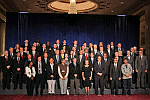
Launch of the Open Government
Partnership in New York
(Photo: Inesc)
|
Sources: Transparency International, Financial Task Force, HumanRights.gov, Inesc
A group of government and civil society organizations from all over the planet, among them the Instituto de Estudos Socioeconômicos (Inesc, focal point of Social Watch in Brazil), launched this Wednesday in New York the Open Government Partnership (OGP), a multilateral initiative that aims to promote transparency, fight corruption, strengthen accountability and empower citizens.
|
Published on Tue, 2011-09-20 12:28
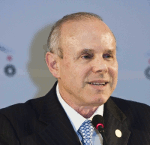
Brazilian minister Guido Mantega
(Photo: Adri Felden/Argosfoto)
|
Source: Eurostep
As part of the so called BRICS countries (along with China, India, Russia and South Africa), Brazil has established itself as one of today’s most important emerging economic powers. The country has not only become increasingly involved in giving aid to African countries but is also expected to provide help to the European Union’s (EU) indebted member states, as a means to overcome the current financial crisis, reported Eurostep based on news published by several media outlets.
|
Published on Tue, 2011-08-30 07:17
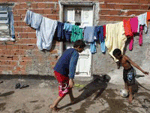
(Photo: Inesc)
|
Source: Inesc
Thousands of people in favelas (shanty towns) in Rio de Janeiro are being evicted from their homes as Brazil prepares for the 2016 Olympic Games, and the same is happening in other cities that will host matches during the 2014 World Cup. According to the lawyer Roberto Benedito Barbosa, an activist in the Sao Paulo Union of Housing Movements (UMM), this is being done "to move the poor farther and farther away from rich neighbourhoods”. This matter has already reached the United Nations where it is giving cause for concern.
|
Published on Fri, 2011-08-19 08:08
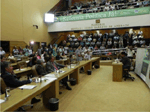
(Photo: Plataforma da Reforma
do Sistema Político)
|
Sources: INESC, Platform to Reform the Political System, Correio do Brasil.
Last Tuesday a coalition of 30 Brazilian civil society organizations began collecting signatures for their Popular Initiative Proposal for Political Reform. If this project is successful it will facilitate citizen participation and monitoring in government matters, and also combat corruption in the organs of the State.
|
Published on Wed, 2011-08-10 07:49
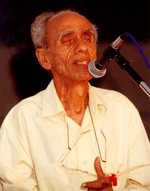
Herbert de Souza, Betinho, founder
of Ibase. (Photo: Ibase/Flickr)
|
Source: Ibase
The Brazilian Institute of Social and Economic Analysis (Ibase), which is dedicated to strengthening democracy and affirming active citizenship, is one of the focal points of Social Watch in this Latin American country. It celebrated its 30th anniversary on Tuesday this week, and up to the middle of September it will be holding a series of commemorative activities opened by ex-President Luiz Inácio Lula da Silva.
|
Published on Thu, 2011-08-04 08:48
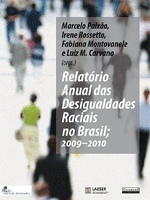
Report on racism in Brazil.
|
Sources: O Estado de Sao Paulo; Abong.
In Brazil infant mortality rates are a very clear indicator of the inequity between different ethnic and racial population sectors. According to the 2009-2010 Annual Report on Racial Inequality in Brazil from the Federal University of Rio de Janeiro (UFRJ), infant mortality among whites is 37.3 per thousand live births but among people of African descent the figure is 62.3.
|
Published on Wed, 2011-07-13 08:06

Annual Report on Women
|
Source: Inesc (in Portuguese)
Brazil’s Annual Report on Women, released this month by the government, shows that 43.1 per cent of women have suffered some kind of violence in their own homes. The percentage falls to 12.3 per cent in the case of men. “The Annual Report is essential for the political struggle in favour of women’s rights”, said Eliana Gracia, expert of the Institute for Socioeconomic Studies (Inesc, one of the focal points of Social Watch in Brazil).
|
Published on Tue, 2009-01-20 11:14
For the second installment of our “Spotlight On…” column, which highlights the innovative work of organizations that make up Social Watch coalitions around the globe, this month we will put a focus on the Social Watch coalition in the host country of this year´s World Social Forum, which will take place on the shores of the Amazon River in the city of Belem do Para, Brazil.
|
|
Source: 
. Published on Fri, 2004-12-03 16:28
|
|
Source: 
. Published on Thu, 2004-12-02 16:55
|
|
Source: 
. Published on Thu, 2004-12-02 10:16
|
Source: Inter Press Service (IPS). Published on Wed, 2004-12-01 16:38
Rio de Janeiro, April 13. After decades of focusing on poverty in the search for ways to fight the enormous rich-poor gap in Brazil, researchers are now turning their gaze towards the wealthy.
|
Published on Wed, 2004-12-01 16:38
Miloon Kothari, UN Special Rapporteur on the right to housing highlighted that the very serious situation in Brazil with respect to homelessness, landlessness, housing deficit and housing inadequacy results from the historic discrimination against the black community and indigenous people, and the marginalization of the poor.
|
Published on Wed, 2004-12-01 16:38
On November 18 Ibase organized the IV Dialogues against Racism that brought together forty civil society organizations. Actions that have proven effective in the combat against racial preconception in the country were introduced and ways were discussed to engage institutions, businesses and people in a single permanent coordination.
|
Published on Wed, 2004-12-01 16:38
Citizens’ Observatory/Social Watch and the Commission of External Relations and National Defense of the Senate invite to the launch of the Citizens’ Observatory 2003 report, "População pobre versus mercado", wich will take place at the Federal Senate, Brasilia, on December 4, 9:30 am.
|
|




